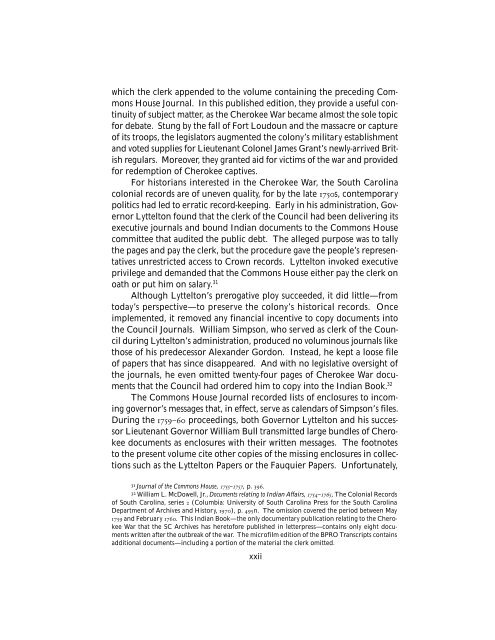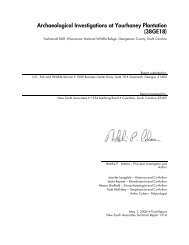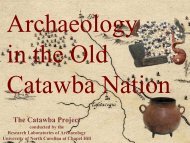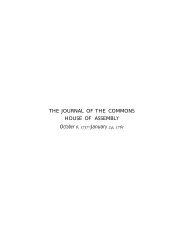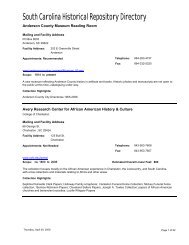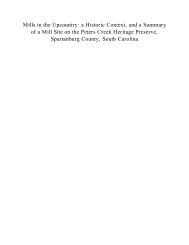The Journal of the Commons House of Assembly
The Journal of the Commons House of Assembly
The Journal of the Commons House of Assembly
Create successful ePaper yourself
Turn your PDF publications into a flip-book with our unique Google optimized e-Paper software.
which <strong>the</strong> clerk appended to <strong>the</strong> volume containing <strong>the</strong> preceding <strong>Commons</strong><strong>House</strong> <strong>Journal</strong>. In this published edition, <strong>the</strong>y provide a useful continuity<strong>of</strong> subject matter, as <strong>the</strong> Cherokee War became almost <strong>the</strong> sole topicfor debate. Stung by <strong>the</strong> fall <strong>of</strong> Fort Loudoun and <strong>the</strong> massacre or capture<strong>of</strong> its troops, <strong>the</strong> legislators augmented <strong>the</strong> colony’s military establishmentand voted supplies for Lieutenant Colonel James Grant’s newly-arrived Britishregulars. Moreover, <strong>the</strong>y granted aid for victims <strong>of</strong> <strong>the</strong> war and providedfor redemption <strong>of</strong> Cherokee captives.For historians interested in <strong>the</strong> Cherokee War, <strong>the</strong> South Carolinacolonial records are <strong>of</strong> uneven quality, for by <strong>the</strong> late 1750s, contemporarypolitics had led to erratic record-keeping. Early in his administration, GovernorLyttelton found that <strong>the</strong> clerk <strong>of</strong> <strong>the</strong> Council had been delivering itsexecutive journals and bound Indian documents to <strong>the</strong> <strong>Commons</strong> <strong>House</strong>committee that audited <strong>the</strong> public debt. <strong>The</strong> alleged purpose was to tally<strong>the</strong> pages and pay <strong>the</strong> clerk, but <strong>the</strong> procedure gave <strong>the</strong> people’s representativesunrestricted access to Crown records. Lyttelton invoked executiveprivilege and demanded that <strong>the</strong> <strong>Commons</strong> <strong>House</strong> ei<strong>the</strong>r pay <strong>the</strong> clerk onoath or put him on salary. 31Although Lyttelton’s prerogative ploy succeeded, it did little—fromtoday’s perspective—to preserve <strong>the</strong> colony’s historical records. Onceimplemented, it removed any financial incentive to copy documents into<strong>the</strong> Council <strong>Journal</strong>s. William Simpson, who served as clerk <strong>of</strong> <strong>the</strong> Councilduring Lyttelton’s administration, produced no voluminous journals likethose <strong>of</strong> his predecessor Alexander Gordon. Instead, he kept a loose file<strong>of</strong> papers that has since disappeared. And with no legislative oversight <strong>of</strong><strong>the</strong> journals, he even omitted twenty-four pages <strong>of</strong> Cherokee War documentsthat <strong>the</strong> Council had ordered him to copy into <strong>the</strong> Indian Book. 32<strong>The</strong> <strong>Commons</strong> <strong>House</strong> <strong>Journal</strong> recorded lists <strong>of</strong> enclosures to incominggovernor’s messages that, in effect, serve as calendars <strong>of</strong> Simpson’s files.During <strong>the</strong> 1759‒60 proceedings, both Governor Lyttelton and his successorLieutenant Governor William Bull transmitted large bundles <strong>of</strong> Cherokeedocuments as enclosures with <strong>the</strong>ir written messages. <strong>The</strong> footnotesto <strong>the</strong> present volume cite o<strong>the</strong>r copies <strong>of</strong> <strong>the</strong> missing enclosures in collectionssuch as <strong>the</strong> Lyttelton Papers or <strong>the</strong> Fauquier Papers. Unfortunately,31 <strong>Journal</strong> <strong>of</strong> <strong>the</strong> <strong>Commons</strong> <strong>House</strong>, 1755–1757, p. 396.32 William L. McDowell, Jr., Documents relating to Indian Affairs, 1754–1765, <strong>The</strong> Colonial Records<strong>of</strong> South Carolina, series 2 (Columbia: University <strong>of</strong> South Carolina Press for <strong>the</strong> South CarolinaDepartment <strong>of</strong> Archives and History, 1970), p. 495n. <strong>The</strong> omission covered <strong>the</strong> period between May1759 and February 1760. This Indian Book—<strong>the</strong> only documentary publication relating to <strong>the</strong> CherokeeWar that <strong>the</strong> SC Archives has heret<strong>of</strong>ore published in letterpress—contains only eight documentswritten after <strong>the</strong> outbreak <strong>of</strong> <strong>the</strong> war. <strong>The</strong> micr<strong>of</strong>ilm edition <strong>of</strong> <strong>the</strong> BPRO Transcripts containsadditional documents—including a portion <strong>of</strong> <strong>the</strong> material <strong>the</strong> clerk omitted.xxii


